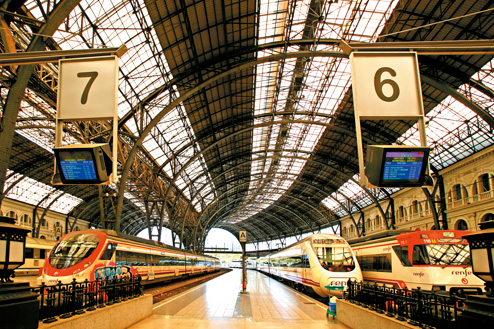Culture
Catalans are befriended slowly. They have a reputation within Spain for being a little closed off and surly, but this is a tad unfair. Those who make an effort will find the natives opening up, and keen to demonstrate their warmth. They also have a reputation for being frugal (some may say tightfisted) but the only way foreigners will notice this is in the low level of tipping. Around 2-3% is considered perfectly reasonable.
A desire to protect and nurture everything Franco’s Spain sought to repress has been a preoccupation for the past 30 years. This is seen is the fervent celebration of Catalan saints and festivals, in the worship of Barcelona FC and the support for traditional dance and activities like castelling.
It is also a politically charged city. During the civil war, Barcelona was the last stand for communists fighting fascists, republicans fighting monarchists, and anarchists fighting capitalists. It is a city that retains an ‘alternative’, vaguely leftist feel, particularly in comparison to the more conservative, devout Spain to the south. But today, that alternative energy is more likely to be expressed through the arts than street protests.
Barcelona’s cultural confidence derives from medieval times, when it was a sea-faring, mercantile power, and has developed through an interaction with its conquerors. The Romans and Visigoths left a political and artistic mark before the city fell under the rule of the Spanish and French, which is more evident today. Barcelona has a largely secular and progressive society. It becomes increasingly cosmopolitan as flocks of Europeans, Africans and Latin Americans move here, attracted by the easy-going, multicultural lifestyle.
A desire to protect and nurture everything Franco’s Spain sought to repress has been a preoccupation for the past 30 years. This is seen is the fervent celebration of Catalan saints and festivals, in the worship of Barcelona FC and the support for traditional dance and activities like castelling.
It is also a politically charged city. During the civil war, Barcelona was the last stand for communists fighting fascists, republicans fighting monarchists, and anarchists fighting capitalists. It is a city that retains an ‘alternative’, vaguely leftist feel, particularly in comparison to the more conservative, devout Spain to the south. But today, that alternative energy is more likely to be expressed through the arts than street protests.
Barcelona’s cultural confidence derives from medieval times, when it was a sea-faring, mercantile power, and has developed through an interaction with its conquerors. The Romans and Visigoths left a political and artistic mark before the city fell under the rule of the Spanish and French, which is more evident today. Barcelona has a largely secular and progressive society. It becomes increasingly cosmopolitan as flocks of Europeans, Africans and Latin Americans move here, attracted by the easy-going, multicultural lifestyle.













